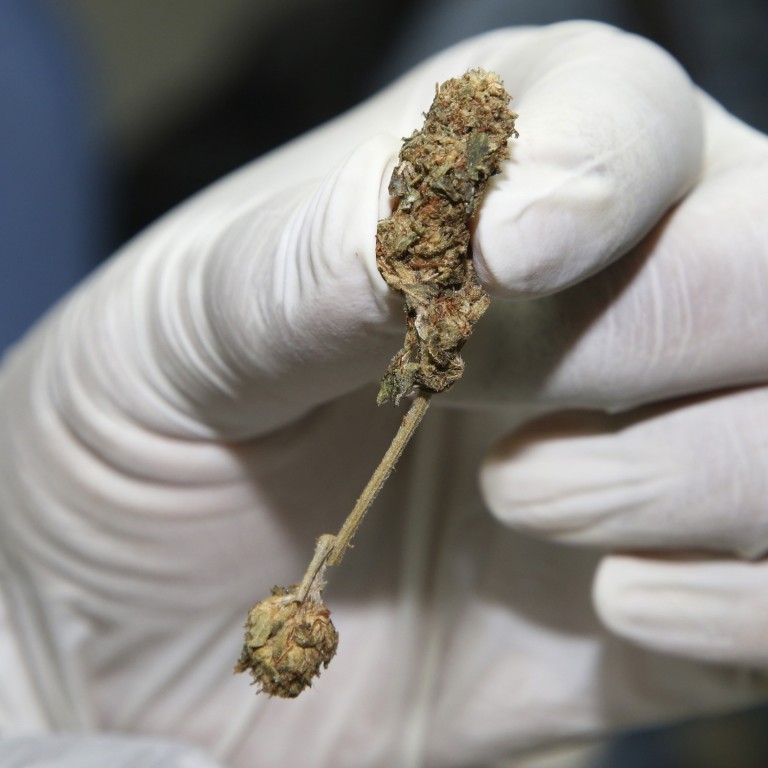
Thai government approves medical use of marijuana and same-sex civil unions
- The measures are seen as part of the junta’s efforts to introduce reforms ahead of the February 24 election
Thailand’s junta government has approved bills legalising medical marijuana and same-sex civil unions, in what some analysts described as a rush to introduce reforms ahead of the February 24 election.
In an extra parliamentary session on Tuesday, parliament approved the use of marijuana for medical purposes and research, though maintaining strict penalties for recreational use. The bill is set to become law once it is approved by the monarchy.
The bill on same-sex unions, approved by the cabinet, is now set to go before parliament. If it is approved, Thailand will be the first nation in Asia to legalise same-sex marriage. The bill confers some, but not all, of the same legal privileges to those of heterosexual couples, including the ability to adopt children.
“This is a New Year’s gift from the National Legislative Assembly to the government and the Thai people,” said Somchai Sawangkarn, chairman of the drafting committee, in a televised parliamentary session.
These guys deal with cannabis in Singapore – and don’t feel paranoid
While countries from Colombia to Canada have legalised marijuana for medical or even recreational use, the drug remains illegal and its usage subject to tough punishment across much of Southeast Asia.
Last month, South Korea became the first nation in Asia to approve medical marijuana, but in Singapore, Indonesia, and Malaysia, marijuana traffickers can be subject to the death penalty.
Until the 1930s, using marijuana to relieve pain and fatigue was part of traditional medical practice in Thailand. Tuesday’s approved bill amends the Narcotic Act of 1979 to legalise the cultivation and use of marijuana and traditional herb kratom for medical purposes.
Green gold rush: Thailand, Malaysia race to legalise medial marijuana
National Assembly member Jet Sirathronont pointed out that the bill still outlaws marijuana for recreational use, though some advocates hope the bill’s approval will pave the way for this to change.
“This is the first baby step forward,” said Chokwan Chopaka, an activist with Highland Network, a cannabis legalisation advocacy group in Thailand.
A primary controversy over legalisation in Thailand involved patent requests by foreign firms that could allow them to dominate the market, making it harder for Thai patients to access medicines and for Thai researchers to access marijuana extracts.

“We’re going to demand that the government revoke all these requests before the law takes effect,” said Panthep Puapongpan, dean of the Rangsit Institute of Integrative Medicine and Anti-ageing.
The bill on same-sex unions will require further approval by parliament, which is facing a backlog of pending legislation ahead of the upcoming election on February 24. This means the bill is likely to depend on the new parliament for approval.
Legal recognition for same-sex partnerships has also been under consideration in Taiwan, where voters rejected a bill to support same-sex marriage in a referendum last month. In Vietnam and Cambodia, informal marriage between same-sex couples is tolerated, while homosexuality is banned in Malaysia, Myanmar, and Singapore.
Despite its LGBTIQ-friendly image, legal protection for sexual minorities is limited in Thailand.
While the approved bill would distinguish Thailand as the only nation in Southeast Asia to legalise same-sex unions, some LGBTIQ rights activists in Thailand have said that rather than supporting equality, the bill legalises a “second-class” status for same-sex couples.
Thailand leads on same-sex unions, so why the LGBT complaints?
Ministerial adviser Nathporn Chatusripitak said: “The differences lie in entitlements to some forms of state welfare. Another difference is personal income tax deductions.”
Chatusripitak said the bill also allows same-sex couples to adopt children, according to Bangkok Post . Both people in the couple must be at least 20 years old and at least one of them must have Thai nationality.
Instead of moving forward with this bill, activists have suggested the National Legislative Assembly should amend Section 1448 of the civil and commercial code to redefine marriage as between two people, not between one man and one woman.
“This bill discriminates against LGBTIQ people,” said independent business owner and activist Khun Ice Namben. “If this bill is passed, it will be harder to get more protections and benefits that are not included. LGBTIQ people will become second-class citizens.”
Additional reporting by Reuters

